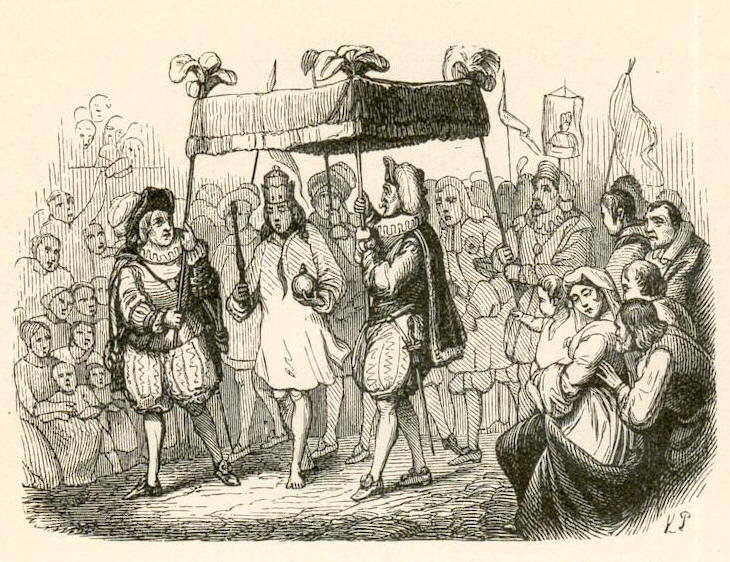Doesn’t the Emperor have some nice new clothes?

The Emperor’s New Clothes
Illustration by Vilhelm Pedersen, Andersen’s first illustrator
In The Emperor’s New Clothes by Hans Christian Andersen, the Emperor hires two weavers to make him a new suit of clothing. The weavers provide no actual clothes but swindle the Emperor by telling him that the “fabric” is invisible to those who are unfit in their position or “hopelessly stupid”. Of course, since there is no fabric at all, NO ONE can see the clothes.
But what happens? Does anyone admit that they cannot see the clothes? Ha! Everyone, even the Emperor himself, agrees that yes, of course they can see the beautiful clothes. Why? Because they assume that everyone else can see the clothes and don’t want to appear unfit or “hopelessly stupid”. So everyone continuously reinforces the false belief to each other.
Yes, you already know this children’s story. So why do I bring this up?
Because you’ve been guilty yourself. You went with the crowd. You deferred to the “experts”. You openly agreed due of your own perceived ignorance. You think that your disbelief is in the minority so you must be wrong. Turns out, your initial hesitation may not only have been right, you may also be in the majority. Here are some examples from the rehab world:
- You’re in the middle of lab session at a course palpating the anterior hip and the instructor says, “You should now be able to feel the psoas tendon. Does everyone feel that?” You hesitate and look around. Everyone else seems to feel it, so you just agree that you too can feel it.
- You are working in the clinic and notice that all of the senior therapists are focusing on “stabilization” exercises with every patient. They must be right so you teach the exercises too.
- You’re on a “friendly” panel at a conference and there is a consensus on how awesome physical therapy is for every diagnosis. You don’t think that is 100% truthful but don’t want to rock the boat. Besides, you aren’t familiar with ALL the literature now are you?

Mugatu expresses his concern…
This is not unique to you. This is what humans do. And it’s not a new idea. Hans Christian Andersen wrote The Emperor’s New Clothes in 1837. That story itself is inspired by a collection of stories published in 1335. Even those stories are based on ancient fables.
It is a phenomenon known as pluralistic ignorance. The intro to the Wikipedia article on it really describes the problem well:
In social psychology, pluralistic ignorance is a situation in which a majority of group members privately reject a norm, but incorrectly assume that most others accept it, and therefore go along with it. This is also described as “no one believes, but everyone thinks that everyone believes.” In short, pluralistic ignorance is a bias about a social group, held by a social group.
It is also known as The Abilene Paradox and it is extremely damaging to societies, professions, and work environments. It is such a problem that Google openly attacks it in their employment structure. Unfortunately it is very prevalent in healthcare.
This gets most dangerous when a vocal minority is holding the biggest, most respected microphone. For example, they run the review board of a journal, hold the reins of a professional association, or drive the ideology of a physical therapy school. Take a little argument from authority and sprinkle in some pluralistic ignorance and…well…it’s not good.
In this way, a “guru” leader and a small cadre of their believers can exert a huge influence over an entire profession. It really sets us all back and needs to stop.
So what can we do to fight pluralistic ignorance? Let’s go back to Andersen’s story. In The Emperor’s New Clothes, a child blurts out the obvious – “But he has nothing on!” This breaks the spell and the rest of the townsfolk start repeating the same observation.
The child doesn’t give a crap. The child isn’t afraid to look stupid. All it takes is someone stating the obvious. As George Orwell famously said,
We have now sunk to a depth at which restatement of the obvious is the first duty of intelligent men.
We need more questions. We need more uncertainty. We need less “respect” (please feel free to twist those words into a straw man – I’m sure someone will). When we come to an agreement based on little more than group consensus, we may not actually have real consensus. A vocal minority with a dose of pluralistic ignorance may be all we have.
In summary…
- Without alternative hypotheses, there can be no progress.
- Do not be afraid to point out “the elephant in the room”.
- It’s okay to be seen as “stupid” – openly admit your confusion.
- Just because you don’t know the answer, it doesn’t mean someone else’s answer is correct, even if it’s the only one out there.
- A lack of questioning does not mean agreement.
